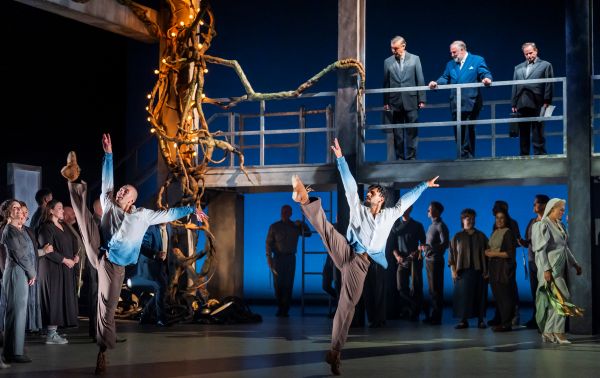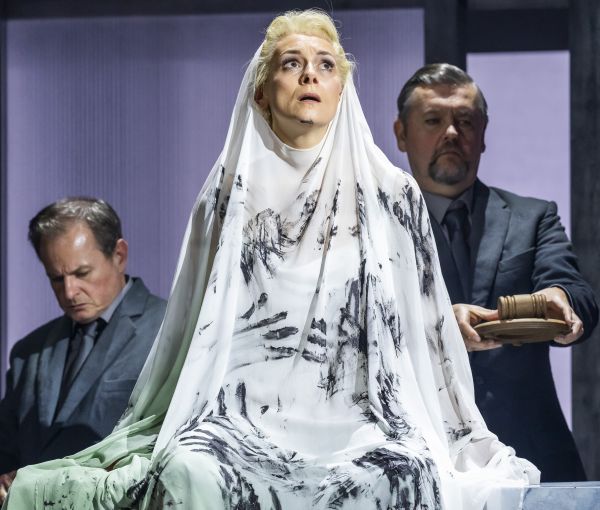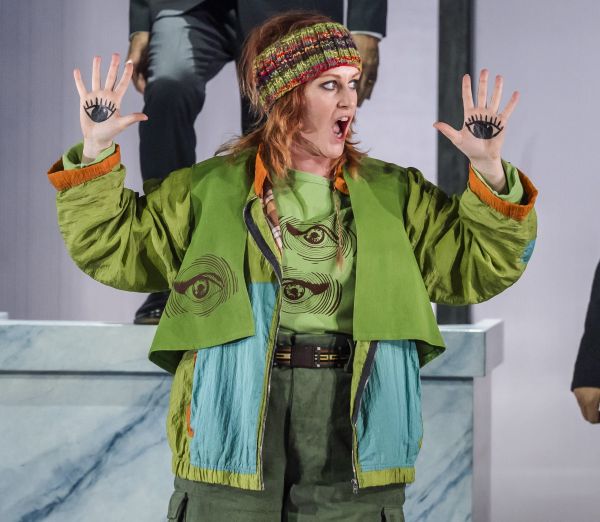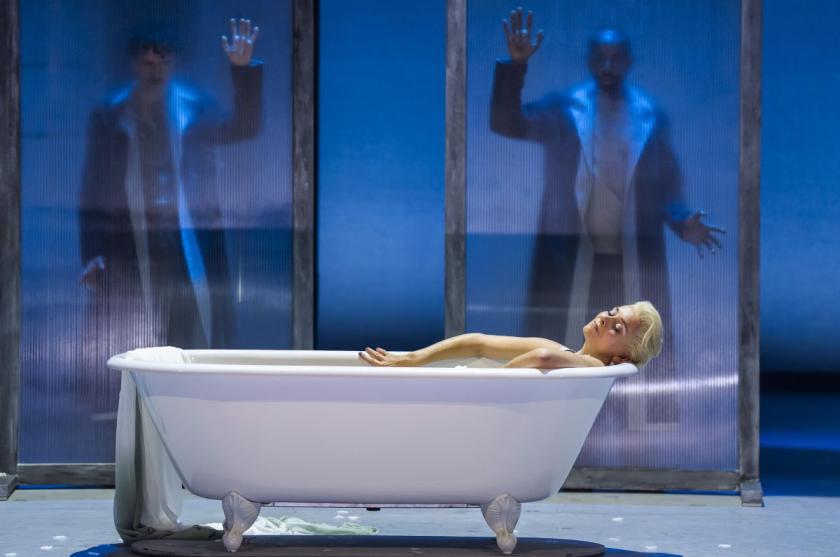Turning Handel oratorio into opera can be a rewarding enterprise. Charles Edwards’ presentation of Joshua, over 15 years ago, for instance, was very effective for Opera North in using projection as well as costume design to make a parallel of the biblical story with Israel’s 1948 War of Independence. And the score offered some vintage material, including the original version of “See the conquering hero comes” and “O had I Jubal’s lyre”.
Others have done similar things: Samson – based on Milton’s work in what he considered to be the style of Greek drama – is a text that cries out to be staged, and has been. Messiah, too, albeit that its meditative nature calls for a different approach from story-telling. Susanna is a late oratorio, the text based on a tale of virtue rewarded from the Apocryphal version of the book of Daniel (not to be confused with Carlisle Floyd’s Susannah, an adaptation in a much more recent American context). Written in the high-minded “poetic” language of the time, it majors on pastoral imagery, and its music seems at times to recall Handel’s classic essay in the genre in Acis and Galatea.
There’s no film projection in Olivia Fuchs’ new production at the Grand Theatre in Leeds and soon to be touring. The decision was made to create a hybrid work in collaboration with Phoenix Dance Theatre, the Leeds contemporary company, and consequently much of the visual interest is in the choreography, by its artistic director Marcus Jarrell Willis, for nine Phoenix performers but also involving the ever-versatile Chorus of Opera North, whose movement skills are resourcefully used as well as those of the principal singers.
A novel extra ingredient is that BSL signing figures in every performance, signer Tianah Hodding not just standing at the side of the stage but a participant in the action, a kind of one-person chorus who reacts to and comments on it. Willis has devised a varied dance language to illustrate the story, sometimes by providing its characters with their own Doppelgänger in parallel with their emotions, at others creating ensembles that fill the centre stage, and, in one striking case, bringing three groups of three to bear on the attempted double seduction of Susanna (pictured above). More than once his interpretation in dance of an aria or chorus ritornello adds a dimension to illustrate the entire piece’s concept, and in particular I liked the way the dancers are seen to invite the chorus members to join them in the joyful celebrations at the end.
Willis has devised a varied dance language to illustrate the story, sometimes by providing its characters with their own Doppelgänger in parallel with their emotions, at others creating ensembles that fill the centre stage, and, in one striking case, bringing three groups of three to bear on the attempted double seduction of Susanna (pictured above). More than once his interpretation in dance of an aria or chorus ritornello adds a dimension to illustrate the entire piece’s concept, and in particular I liked the way the dancers are seen to invite the chorus members to join them in the joyful celebrations at the end.
Nonetheless, the staging closely follows the scriptural script. “Susanna and the Elders” is about a chaste and faithful wife who is the subject of, first, voyeurist lust on the part of two supposed pillars of the community, then an attempted joint entrapment by the same pair as she takes a bath in her private garden. She refuses them and is publicly accused of infidelity with an un-named “wanton youth” whom they say they saw. Instantly condemned to death (two witnesses being the requisite evidence), she is saved at the last minute by the intervention of the prophet Daniel, who asks each accuser separately what kind of tree shielded the supposed act, and they give different answers – hence collapse of prosecution case, and Susanna’s faithfulness and integrity are vindicated.
You don’t need to look far to find hypocritical and lecherous men taking advantage of innocent women in every age, so the translation to a timeless present (design by Zahra Mansouri) is highly apt, and Susanna is almost an unjustly done-by Everywoman. There’s an easily recognisable wedding scene for her and her husband, Joachim, a very modern-looking bath for her to take her dip in (as she sings “Crystal streams in murmurs flowing”), and when she’s condemned a stone altar appears, to imply threatened blood sacrifice, though the main immediate visual action is her humiliation by besmirching hands.
 In every way, the jewel of the production is the title role performance by Anna Dennis (pictured left). She interacts with everyone on the stage, she catches the emotions of the role in every glance and movement, and she sings with precisely tuned beauty. Her air of defiance to the randy pair, “If guiltless blood be your intent/ I here resign it all/ Fearless of death” is one of the highlights of the evening (and well lit in Jake Wiltshire’s scheme) – and striking as, breaking baroque convention, one of the Elders is permitted to interrupt her soliloquy before she resumes it with greater fervour; likewise her steadfast assertion of innocence before the baying crowd at the start of the final Act, “”Faith displays her rosy wing…” (well staged, as the onlookers humiliate her).
In every way, the jewel of the production is the title role performance by Anna Dennis (pictured left). She interacts with everyone on the stage, she catches the emotions of the role in every glance and movement, and she sings with precisely tuned beauty. Her air of defiance to the randy pair, “If guiltless blood be your intent/ I here resign it all/ Fearless of death” is one of the highlights of the evening (and well lit in Jake Wiltshire’s scheme) – and striking as, breaking baroque convention, one of the Elders is permitted to interrupt her soliloquy before she resumes it with greater fervour; likewise her steadfast assertion of innocence before the baying crowd at the start of the final Act, “”Faith displays her rosy wing…” (well staged, as the onlookers humiliate her).
Claire Lees, from the Opera North Chorus, has the important role of young Daniel at the close of the drama, and, dressed as an obvious outsider and rebel, sang with force and distinction, her “Chastity, thou cherub bright” a fine contribution (pictured below right). One speciality of her and others’ solo singing was in decorative incipits to the da capo returns in arias, which were striking and expressive.
Because of the necessity for an open stage to accommodate the dancing, there were a few occasions when solo singers were not ideally placed to make their best impact. Matthew Brook, as Susanna’s father Chelsias, suffered a little in this respect in his “Who fears the Lord may dare all foes”, and “Raise your voice to sounds of joy”, and James Hall, the unimpeachable husband who happens to be away when all the bad stuff happens, did also. But he has a glorious moment in the one and only duet in the score, right at the end – a lovely two-voice cadenza for him and Anna Dennis forming its glorious climax.
The two evil Elders, Colin Judson, and Karl Humml, are a well-contrasted pair in almost every respect: voice type, stature and demeanour. They sang with distinction and each managed to play their lecherous type with scary realism.
 Johanna Soller, a specialist in baroque style, conducts from one of two harpsichords and obtains both suitably weighty tone and periodic contrasting lightness from the Orchestra of Opera North, with skilfully chosen tempi. There were occasional lapses of string ensemble and co-ordination between chorus and pit on the first night, but no doubt those will soon be overcome. But the accompaniment to Joacim’s “On the rapid whirlwind’s wing” showed the band, led by Katie Stillman, at its athletic best. The chorus singing (prepared by Anthony Kraus) was magnificent and one of the best qualities of the performance – notably in “Righteous heaven”, which closes the first Act, the energetic “Let justice reign” in the second – an energy that persisted after the interval into the opening of Act 3.
Johanna Soller, a specialist in baroque style, conducts from one of two harpsichords and obtains both suitably weighty tone and periodic contrasting lightness from the Orchestra of Opera North, with skilfully chosen tempi. There were occasional lapses of string ensemble and co-ordination between chorus and pit on the first night, but no doubt those will soon be overcome. But the accompaniment to Joacim’s “On the rapid whirlwind’s wing” showed the band, led by Katie Stillman, at its athletic best. The chorus singing (prepared by Anthony Kraus) was magnificent and one of the best qualities of the performance – notably in “Righteous heaven”, which closes the first Act, the energetic “Let justice reign” in the second – an energy that persisted after the interval into the opening of Act 3.
One puzzle: despite her lively imagination in many details of the staging, there was a moment in Olivia Fuchs’ direction that seemed to jar. As Susanna sings her final triumphant air, “Guilt trembling spoke my doom”, she also gets her own back on her accusers – very clearly and physically. True, she’s singing about “oppression” being “left to grieve”, but if her story is seen as one of purity, dignity and integrity, it doesn’t quite fit. Or maybe she isn’t a complete paragon after all – just one of us.














Add comment